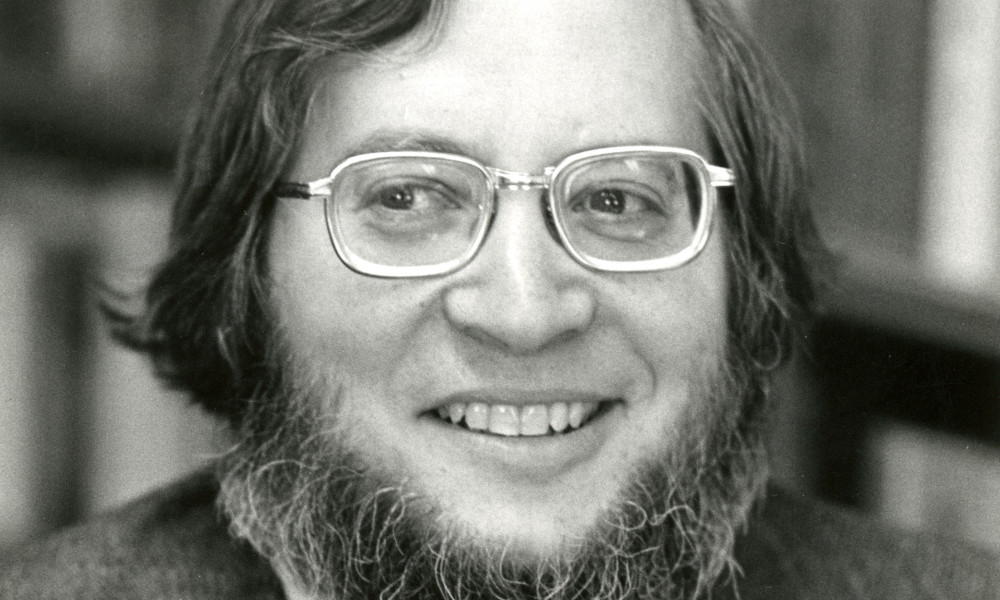From medieval Arabic texts to Delta blues, Beaumont left students with lessons that shaped both intellect and identity.

Daniel Beaumont, a professor emeritus in the Department of Religion and Classics at the University of Rochester, is being remembered by colleagues for his intellectual curiosity, insatiable creativity, and passionate teaching across seemingly disparate fields—from Arabic medieval and contemporary literature, to European philosophy, and blues music.
Beaumont, who died in August at the age of 73, arrived on campus in 1992 and officially retired in 2020. He continued teaching on occasion, the last time in spring 2024.
Besides Arabic language courses, Beaumont taught Arabic literature in translation, contemporary Arabic fiction, and the Arab Revolutions. He’s the author of Slave of Desire: Sex, Love, and Death in The 1001 Nights (Fairleigh Dickinson University Press, 2002), a comparative literary study of the medieval Arabic story collection The Arabian Nights (also referred to as 1001 Nights). At one point he served as the program coordinator for the University’s Cairo Beginning Arabic Summer Program.
And then there was the blues. His decades-long close friend Steve Grills, a Rochester-based blues musician, says Beaumont was an afficionado of the music as long as he can remember. After a road trip with three friends in 2000 to the music’s birthplaces—Memphis and the Mississippi Delta—Beaumont merged his private and professional interests by teaching a course on the music’s history—REL 151: The Blues. The class proved “deeply influential” and “life changing,” according to his Rochester colleague and close friend Douglas Brooks, a professor of religion. “More than one student said to me, unbeknownst to Dan, that his blues class changed the way they saw the world and how they saw themselves. What Dan taught was important to students who took to heart what he had to say.”
Another book followed—Preachin’ the Blues: The Life and Times of Son House (Oxford University Press, 2011)—a biography of Delta bluesman Eddie James (Son) House (1902–1988). House counts among the earliest blues artists and his use of repetitive rhythms and Southern gospel and spirituals inspired musicians such as Muddy Waters and Robert Johnson.
“Dan was a unique spirit in our department—always eager to share his love of literature and music with his colleagues, his students, and friends,” says department chair Nora Rubel, an associate professor of religion and the Jane and Alan Batkin Professor in Jewish Studies. “As a professor of Arabic literature, he had a rare gift for bringing ancient texts to life, revealing their beauty and timeless wisdom to all who had the privilege of studying with him.”
‘A curious, compelling intellectual force’
Beaumont earned a bachelor’s degree in 1975 in English literature, followed by a master’s degree in 1986 in Near Eastern languages and civilization—both from the University of Washington. In 1991, he graduated with a PhD in Near Eastern studies and classical Arabic literature from Princeton University.
Yet, academic writing was never enough for Beaumont—a “curious, compelling intellectual force, not always appreciated,” according to Brooks—to fully express himself. “He didn’t just drive in one lane, he could manage the whole breadth of serious, curious, intellectual interest.”
Ideas were perpetually percolating—some came to fruition, others remained incomplete. He produced videos, wrote articles for the left-leaning website CounterPunch, collaborated in a theater production, had a novel and an autobiography in the works, and had already signed on with a literary agent, hoping that Hollywood might pick it up.
“Dan’s stories were legendary,” says Brooks, including the one about his father who worked for a cloud-seeding company that made it rain in Libya—hired by Muammar Gaddafi’s government. Beaumont worked one winter for the same company as a weather radar observer (working with weather balloons), something he wrote about later for CounterPunch. And there’s a twist (that he writes about in the same story): Beaumont’s father, a World War II pilot, was also a CIA spy, collecting intel about the Libyan military while delivering rain.
In a 2012 interview with Blues GR, Beaumont said that going to Libya in from 1981 to 1982 with his father “changed my life, and my understanding of him. He was an extraordinary person. Everything went wrong while we were there, political crisis, and yet it was a great adventure. That’s how I got interested in Arabs and Arabic.”
Beaumont, who grew up originally in the Pacific Northwest and lived and worked intermittently in the Middle East, maintained throughout his life a close relationship with contemporary Arabic and Turkish culture and literature. He had friends all over the world who were the “literary cultural folk who were almost invariably involved in some sort of freedom movements and political activism,” according to Brooks. He was locally politically active, too.
“He was a peculiar, eccentric, talented, creative character,” says Brooks. “The sort of guy who sat down at a bar and would strike up a conversation with you and be more interested in you, than he would be in telling you who he was.”
Read Beaumont’s obituary in the Democrat & Chronicle.




